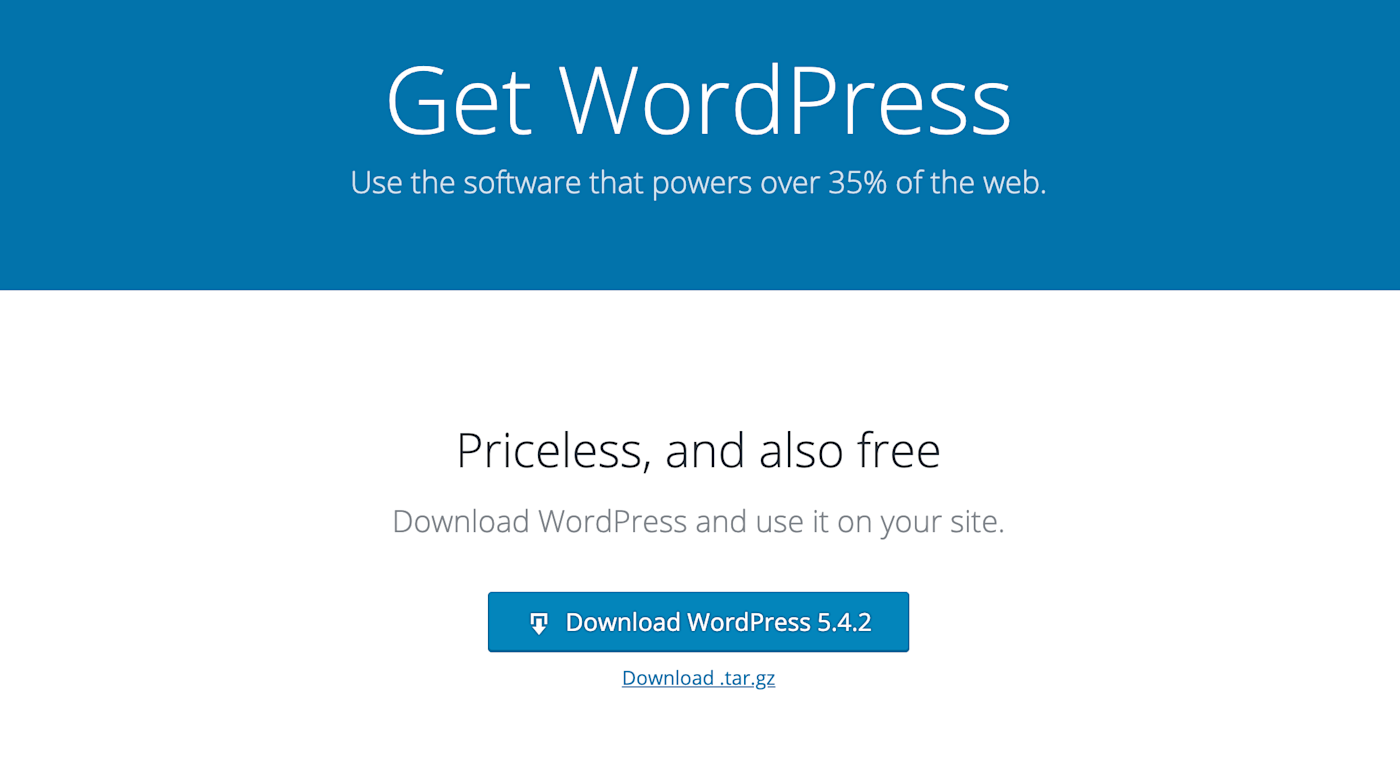Words that mean two different things are confusing. Biweekly, for example, means twice a week or every other week, which is why there's no excuse for ever using it.
WordPress isn't a word no one should use, but it does confusingly refer to two different things: a content management system, or CMS, and a web hosting service. The divide is sometimes described using two domain names: WordPress.org (the CMS) and WordPress.com (the web hosting service).
So what's the difference between WordPress.org and WordPress.com?
WordPress.org is where you can download WordPress, an open source CMS. It's a totally free tool you can use to build a website that you have full control over, but it's up to you to find a place for that website to live.
WordPress.com is a commercial service where you can host a website using a heavily modified version of the WordPress CMS. You will have less control over this site, but it's going to be easier to set up.
Most of the time, when people say WordPress—particularly in a small business context—you can assume they're referring to the CMS. It's still worth knowing what the difference is, however, so let's break things down a little more.
Wait, are WordPress.com and WordPress.org run by the same company? Not exactly. WordPress.com is run by Automattic, a private company that also owns a few prominent WordPress plugins, including Akismet and WooCommerce. WordPress.org, and its WordPress CMS, are managed by the nonprofit WordPress Foundation. Automattic does contribute code to the open source WordPress project, but they don't own the project, and they donated the brand name "WordPress" to the foundation back in 2010.
WordPress.org is a free and flexible content management system

WordPress.org is an open source content management system. I know what you're thinking: those are literally just words. Let's break them down.
Open source means software that is completely free to download and use, as well as completely free to tweak for your own purposes. Here's a more complete definition, if you want.
A content management system is software you can use to manage a website. There's nothing stopping you from learning to code in HTML and building a website from scratch, then adding new posts and pages by manually making more HTML pages. But content management systems mean you don't have to do that.
WordPress is the most popular CMS on the planet—around 38 percent of all websites are built using it—in no small part because it's free. It's also extremely customizable: there are hundreds of thousands of themes you can download to change how your website looks. Some of these are free, some you have to pay for. You could even hire a designer to build you something custom. A WordPress website can look however you want it to.
WordPress also supports plugins, which allow you to add custom features to your websites, like eCommerce capabilities, contact forms, tracking options, and pretty much anything else you can imagine. There are multiple free plugins available for most capabilities you can think of, alongside a bunch of paid options with more features.
You can go to WordPress.org and download the entire thing right now—it's only 12 megabytes. The catch: your website has to live somewhere so people can access it. You're going to have to find a host for your site, such as DreamHost or Bluehost. Then you have to install WordPress, and any themes or plugins you want, yourself.
This isn't as hard as it sounds, and most hosts will offer documentation or even wizards that make setting this all up very easy. But you'll need to do some reading, or hire someone else who knows how to do it.
If you decide to use WordPress.org, you can use Zapier to connect it to your other favorite apps. Learn how Zapier works and then see how you can use Zapier's WordPress integrations to save you time when it comes to managing your CMS workflows.
WordPress.com is a web host that uses the WordPress CMS

There are, generally speaking, two different kinds of website hosts. There are companies that more or less just handle hosting and expect you to build a website yourself. Bluehost or DreamHost, which I mentioned above, are good examples. Setting up a website on these services generally requires a certain amount of know-how. Plus, you'll be working in two systems: your web host and your chosen CMS. But you'll save money and have full control over the site when you're done.
Then there are web hosts that provide a custom CMS that's focused on ease of use. You're going to pay a little more, and won't have full control over everything, but setting everything up will be fast and simple. This category includes basically any website builder you've heard advertised before a podcast or on YouTube—Squarespace or Wix, for example.
WordPress.com is in that second category of web hosts—offering a streamlined way to set up a website. The only difference is that, instead of offering a proprietary CMS, WordPress.com offers websites built on a modified version of the WordPress CMS.
There's a real focus on ease of use. You can head to WordPress.com right now and set up a website in a couple of minutes. There's even a free version, meaning you wouldn't have to pay to get started. This free version is why WordPress.com is a very popular place for people to set up blogs (though you can build more than blogs on it).
But in addition to showing ads on your page and not giving you a custom domain, the free version of WordPress.com isn't very customizable, particularly when compared to the self-hosted version. A few themes and plugins are available to all users, but most are locked behind a paywall. A quick look at the pricing page reveals this: plans start at $4 per month, but an $8 per month premium plan is necessary if you want to do things like process payments. A $25 per month Business plan is necessary if you want to install custom themes and plugins.
It's hard to directly compare this to the cost of running a self-hosted WordPress instance—because the cost there depends on your web host—but basically, you're paying more for a service that's easier to use. WordPress.com, notably, offers support, which means that if you get stuck, you have someone to email or, depending on how much you're paying, call.
Can I migrate from WordPress.com to self-hosted WordPress? Or vice versa?
WordPress.com websites aren't that different from self-hosted ones, meaning it's possible to migrate your posts, pages, and the rest of your data between the two kinds of websites.
WordPress.com actually offers a guide for migrating to a self-hosted WordPress instance, and one for migrating a self-hosted WordPress site over to WordPress.com. Both of these are an excellent starting point if you're thinking of moving one way or the other.
Should I use WordPress.com or WordPress.org?
So: which of these two services should you use? I honestly have no idea, because it ultimately depends on your needs. But to paint in broad strokes:
You should use WordPress.org if you're willing to put in the work to build a highly customized website yourself, or if you want to shop around and find the best value for hosting.
You should use WordPress.com if you want to set up something quickly, are fine with less flexibility, and are willing to pay a bit more for support and ease of use.
One last thing: Zapier offers a WordPress integration, allowing you to connect your website to thousands of apps. That means you can do things like automatically post all your new WordPress blog posts to Facebook. But the Zapier integration only works with self-hosted WordPress instances, so if that matters to you, don't use WordPress.com as your host.
Read more: The best WordPress eCommerce plugins









